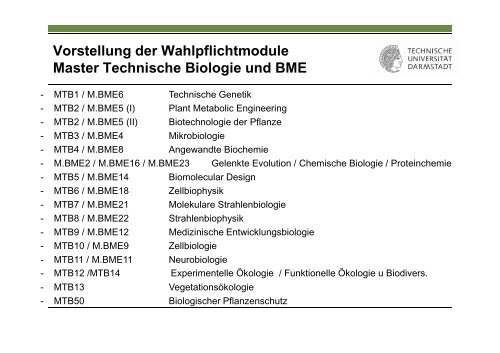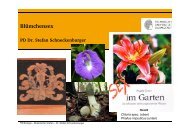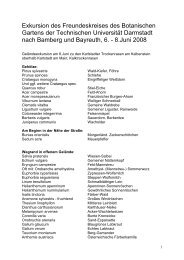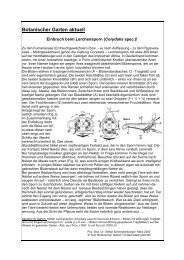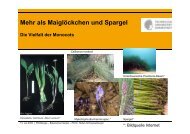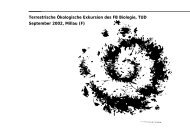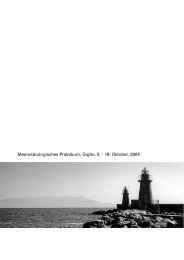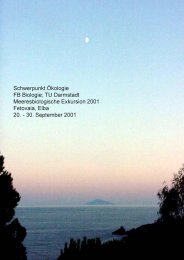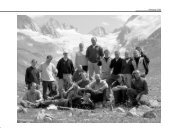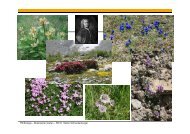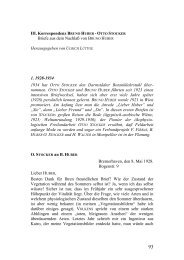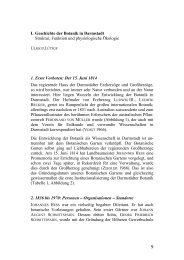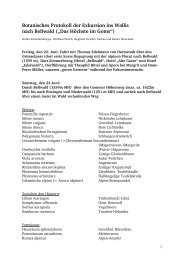Mastermodule_Vorstellung_SS13 - Fachbereich Biologie der TU
Mastermodule_Vorstellung_SS13 - Fachbereich Biologie der TU
Mastermodule_Vorstellung_SS13 - Fachbereich Biologie der TU
Sie wollen auch ein ePaper? Erhöhen Sie die Reichweite Ihrer Titel.
YUMPU macht aus Druck-PDFs automatisch weboptimierte ePaper, die Google liebt.
<strong>Vorstellung</strong> <strong>der</strong> Wahlpflichtmodule<br />
Master Technische <strong>Biologie</strong> und BME<br />
- MTB1 / M.BME6 Technische Genetik<br />
- MTB2 / M.BME5 (I) Plant Metabolic Engineering<br />
- MTB2 / M.BME5 (II) Biotechnologie <strong>der</strong> Pflanze<br />
- MTB3 / M.BME4 Mikrobiologie<br />
- MTB4 / M.BME8 Angewandte Biochemie<br />
- M.BME2 / M.BME16 / M.BME23 Gelenkte Evolution / Chemische <strong>Biologie</strong> / Proteinchemie<br />
- MTB5 / M.BME14 Biomolecular Design<br />
- MTB6 / M.BME18 Zellbiophysik<br />
- MTB7 / M.BME21 Molekulare Strahlenbiologie<br />
- MTB8 / M.BME22 Strahlenbiophysik<br />
- MTB9 / M.BME12 Medizinische Entwicklungsbiologie<br />
- MTB10 / M.BME9 Zellbiologie<br />
- MTB11 / M.BME11 Neurobiologie<br />
- MTB12 /MTB14 Experimentelle Ökologie / Funktionelle Ökologie u Biodivers.<br />
- MTB13 Vegetationsökologie<br />
- MTB50 Biologischer Pflanzenschutz
<strong>Vorstellung</strong> <strong>der</strong> Wahlpflichtmodule<br />
Master Technische <strong>Biologie</strong> und BME<br />
- MTB1 / M.BME6 Technische Genetik<br />
- MTB2 / M.BME5 (I) Plant Metabolic Engineering<br />
- MTB2 / M.BME5 (II) Biotechnologie <strong>der</strong> Pflanze<br />
- MTB3 / M.BME4 Mikrobiologie<br />
- MTB4 / M.BME8 Angewandte Biochemie<br />
- M.BME2 / M.BME16 / M.BME23 Gelenkte Evolution / Chemische <strong>Biologie</strong> / Proteinchemie<br />
- MTB5 / M.BME14 Biomolecular Design<br />
- MTB6 / M.BME18 Zellbiophysik<br />
- MTB7 / M.BME21 Molekulare Strahlenbiologie<br />
- MTB8 / M.BME22 Strahlenbiophysik<br />
- MTB9 / M.BME12 Medizinische Entwicklungsbiologie<br />
- MTB10 / M.BME9 Zellbiologie<br />
- MTB11 / M.BME11 Neurobiologie<br />
- MTB12 /MTB14 Experimentelle Ökologie / Funktionelle Ökologie u Biodivers.<br />
- MTB13 Vegetationsökologie<br />
- MTB50 Biologischer Pflanzenschutz
<strong>Vorstellung</strong> <strong>der</strong> Wahlpflichtmodule<br />
Master Technische <strong>Biologie</strong> und BME<br />
- MTB1 / M.BME6 Technische Genetik<br />
- MTB2 / M.BME5 (I) Plant Metabolic Engineering<br />
- MTB2 / M.BME5 (II) Biotechnologie <strong>der</strong> Pflanze<br />
- MTB3 / M.BME4 Mikrobiologie<br />
- MTB4 / M.BME8 Angewandte Biochemie<br />
- M.BME2 / M.BME16 / M.BME23 Gelenkte Evolution / Chemische <strong>Biologie</strong> / Proteinchemie<br />
- MTB5 / M.BME14 Biomolecular Design<br />
- MTB6 / M.BME18 Zellbiophysik<br />
- MTB7 / M.BME21 Molekulare Strahlenbiologie<br />
- MTB8 / M.BME22 Strahlenbiophysik<br />
- MTB9 / M.BME12 Medizinische Entwicklungsbiologie<br />
- MTB10 / M.BME9 Zellbiologie<br />
- MTB11 / M.BME11 Neurobiologie<br />
- MTB12 /MTB14 Experimentelle Ökologie / Funktionelle Ökologie u Biodivers.<br />
- MTB13 Vegetationsökologie<br />
- MTB50 Biologischer Pflanzenschutz
MTB2/M.BME5 – Plant Metabolic Engineering (H. Warzecha)<br />
(Pflanzlicher Sekundärmetabolismus und Metabolic Engineering)
Vorlesung: Täglich, 3 Wochen, 1 Stunde<br />
English!<br />
• Groups of secondary plant metabolites will be presented according to their<br />
biosynthetic route<br />
• Key biosynthetic pathways will be discussed in detail<br />
(spatial and temporal organization, regulation)<br />
• Compounds of interest will be featured in detail<br />
• Physiological function, if known<br />
• Recovery and use in chemical, food and feed industry<br />
• Use as pharmaceutics including pharmacological mode of action<br />
• Potential for optimization via metabolic engineering<br />
Mündliche Prüfung (auch für Spezialvorlesung)
Seminare: Literaturseminare, Vortrag<br />
Praktikum:<br />
-Synthetisch-biologischer Ansatz zur Modifikation des pflanzlichen<br />
Sekundärmetabolismus<br />
- Nutzung und Weiterentwicklung eines modularen Klonierungssystems<br />
(ähnlich BioBrick)<br />
- Analytische Methoden (DC, HPLC)<br />
- Biochemisch-molekularbiologische Methoden<br />
Kein Protokoll, son<strong>der</strong>n „Publikation“
<strong>Vorstellung</strong> <strong>der</strong> Wahlpflichtmodule<br />
Master Technische <strong>Biologie</strong> und BME<br />
- MTB1 / M.BME6 Technische Genetik<br />
- MTB2 / M.BME5 (I) Plant Metabolic Engineering<br />
- MTB2 / M.BME5 (II) Biotechnologie <strong>der</strong> Pflanze<br />
- MTB3 / M.BME4 Mikrobiologie<br />
- MTB4 / M.BME8 Angewandte Biochemie<br />
- M.BME2 / M.BME16 / M.BME23 Gelenkte Evolution / Chemische <strong>Biologie</strong> / Proteinchemie<br />
- MTB5 / M.BME14 Biomolecular Design<br />
- MTB6 / M.BME18 Zellbiophysik<br />
- MTB7 / M.BME21 Molekulare Strahlenbiologie<br />
- MTB8 / M.BME22 Strahlenbiophysik<br />
- MTB9 / M.BME12 Medizinische Entwicklungsbiologie<br />
- MTB10 / M.BME9 Zellbiologie<br />
- MTB11 / M.BME11 Neurobiologie<br />
- MTB12 /MTB14 Experimentelle Ökologie / Funktionelle Ökologie u Biodivers.<br />
- MTB13 Vegetationsökologie<br />
- MTB50 Biologischer Pflanzenschutz
MTB2/M.BME5 –Biotechnologie d. Pflanze<br />
Prof. Ralf Kaldenhoff<br />
Zeitraum:<br />
18.08-21.09 ?<br />
Voraussetzung:<br />
Fortgeschrittene Kenntnisse in<br />
Nukleinsäurechemie,<br />
Molekulargenetik, Biochemie<br />
Kapazität:<br />
20 Personen<br />
Juni 2013 | <strong>Fachbereich</strong> <strong>Biologie</strong> | Prof. Kaldenhoff | 12
MTB2 Pflanzen Biotechnologie AG Kaldenhoff<br />
Vorlesung und Seminar:<br />
technische Aspekte <strong>der</strong> gentechnischen<br />
Verän<strong>der</strong>ung von Pflanzen<br />
neue Verfahren <strong>der</strong> Modifizierung von Pflanzen<br />
züchterische Verfahren<br />
Pflanzenzellkultur und Regeneration<br />
Gentechnik in <strong>der</strong> Landwirtschaft<br />
Sicherheit in <strong>der</strong> Gentechnik<br />
Juni 2013 | <strong>Fachbereich</strong> <strong>Biologie</strong> | Prof. Kaldenhoff | 13
MTB2 Pflanzen Biotechnologie AG Kaldenhoff<br />
Praktikum:<br />
Ertragssteigerung bei Pflanzen<br />
Zielvorgabe: Überexpression verschiedener Kandidaten-Proteine<br />
Selbständiges Ausarbeiten einer Arbeitsstrategie um transgene<br />
Pflanzen zu erhalten (Methoden umfassen molekularbiologische und<br />
Pflanzentransformations-Techniken)<br />
Selbständige Durchführung von <strong>der</strong> Klonierung in Pflanzen-<br />
Expressionsvektoren bis zur Pflanzentransformation sowie <strong>der</strong> nötigen<br />
Kontroll-Experimente<br />
Phänotypische und physiologische Analyse von bereits transformierten<br />
Pflanzen (Wie weißt man Ertragssteigerung nach?)<br />
Juni 2013 | <strong>Fachbereich</strong> <strong>Biologie</strong> | Prof. Kaldenhoff | 14
<strong>Vorstellung</strong> <strong>der</strong> Wahlpflichtmodule<br />
Master Technische <strong>Biologie</strong> und BME<br />
- MTB1 / M.BME6 Technische Genetik<br />
- MTB2 / M.BME5 (I) Plant Metabolic Engineering<br />
- MTB2 / M.BME5 (II) Biotechnologie <strong>der</strong> Pflanze<br />
- MTB3 / M.BME4 Mikrobiologie<br />
- MTB4 / M.BME8 Angewandte Biochemie<br />
- M.BME2 / M.BME16 / M.BME23 Gelenkte Evolution / Chemische <strong>Biologie</strong> / Proteinchemie<br />
- MTB5 / M.BME14 Biomolecular Design<br />
- MTB6 / M.BME18 Zellbiophysik<br />
- MTB7 / M.BME21 Molekulare Strahlenbiologie<br />
- MTB8 / M.BME22 Strahlenbiophysik<br />
- MTB9 / M.BME12 Medizinische Entwicklungsbiologie<br />
- MTB10 / M.BME9 Zellbiologie<br />
- MTB11 / M.BME11 Neurobiologie<br />
- MTB12 /MTB14 Experimentelle Ökologie / Funktionelle Ökologie u Biodivers.<br />
- MTB13 Vegetationsökologie<br />
- MTB50 Biologischer Pflanzenschutz
MTB 3/M.BME 4 - Mikrobiologie<br />
Dozenten: Prof. Felicitas Pfeifer, Prof. Jörg Simon, PD Dr. Arnulf Kletzin<br />
Inhalte:<br />
Biochemische, genetische, molekularbiologische Methoden<br />
angewandt auf Mikroorganismen<br />
<strong>Fachbereich</strong> <strong>Biologie</strong> | Mikrobiologie | Prof. Felicitas Pfeifer | 16
MTB 3/M.BME 4 - Mikrobiologie<br />
Vorlesungen: Themen zur Physiologie und Ökologie von Mikroorganismen<br />
Enzyme und beson<strong>der</strong>e Abbauleistungen; Überlebensstrategien<br />
Seminar: in Gruppen zu ergänzenden Themen<br />
Selbstorganisierte, forschungsnahe Projekte:<br />
-Molekularökologische Studien, extreme Standorte<br />
-S-Metabolismus / Enzyme hyperthermophiler Archaea<br />
-Genregulation halophiler Archaea / Mutationsstudien<br />
-N-Kreislauf / bakt. Energiestoffwechsel / Metalloenzyme<br />
-Synthetische <strong>Biologie</strong> und Biotechnologie<br />
<strong>Fachbereich</strong> <strong>Biologie</strong> | Mikrobiologie | Prof. Felicitas Pfeifer | 17
<strong>Vorstellung</strong> <strong>der</strong> Wahlpflichtmodule<br />
Master Technische <strong>Biologie</strong> und BME<br />
- MTB1 / M.BME6 Technische Genetik<br />
- MTB2 / M.BME5 (I) Plant Metabolic Engineering<br />
- MTB2 / M.BME5 (II) Biotechnologie <strong>der</strong> Pflanze<br />
- MTB3 / M.BME4 Mikrobiologie<br />
- MTB4 / M.BME8 Angewandte Biochemie<br />
- M.BME2 / M.BME16 / M.BME23 Gelenkte Evolution / Chemische <strong>Biologie</strong> / Proteinchemie<br />
- MTB5 / M.BME14 Biomolecular Design<br />
- MTB6 / M.BME18 Zellbiophysik<br />
- MTB7 / M.BME21 Molekulare Strahlenbiologie<br />
- MTB8 / M.BME22 Strahlenbiophysik<br />
- MTB9 / M.BME12 Medizinische Entwicklungsbiologie<br />
- MTB10 / M.BME9 Zellbiologie<br />
- MTB11 / M.BME11 Neurobiologie<br />
- MTB12 /MTB14 Experimentelle Ökologie / Funktionelle Ökologie u Biodivers.<br />
- MTB13 Vegetationsökologie<br />
- MTB50 Biologischer Pflanzenschutz
Angewandte Biochemie<br />
Wahlpflichtmodul M.BT4 / M.BME8 (im SoSe)<br />
AKs Dencher, Kolmar und Schmitz<br />
Termin:<br />
Mo. 22.07. bis Fr. 16.08.13<br />
Vorbesprechung:<br />
12.07.13<br />
N. Dencher H. Kolmar K. Schmitz<br />
Kapazität: 25 Plätze<br />
Zulassungsvoraussetzungen:<br />
Mindestens 8 CP aus Vorlesungen,<br />
Seminaren und Praktika in <strong>der</strong><br />
Biochemie.<br />
16.06.13 | <strong>Fachbereich</strong> Chemie | Profs. N. Dencher; H. Kolmar; K. Schmitz | Modulvorschau: Angewandte Biochemie M.BME8 | 19
Vorlesung und Seminar<br />
Vorlesung<br />
Beliebige 2 SWS-Vorlesung aus dem Kanon <strong>der</strong> Biochemie (FB Chemie)<br />
Mit Übung<br />
Bei Vorlesungen ohne Übung: Teilnahme an <strong>der</strong> Moodle-Übung zum<br />
Praktikum<br />
Seminar<br />
Gemeinsames Seminar <strong>der</strong> AKs Kolmar, Dencher, Schmitz<br />
Semesterbegleitend (Mi-Abend)<br />
alternativ: Studienprojekt HighChem o<strong>der</strong> Tagungsbesuch<br />
13.06.13 | <strong>Fachbereich</strong> Chemie | Profs. N. Dencher; H. Kolmar; K. Schmitz | Modulvorschau: Angewandte Biochemie M.BME8 | 20
Praktikumsthemen<br />
AK Dencher:<br />
AK Schmitz:<br />
AK Kolmar:<br />
Biophysikalische Chemie<br />
Bakteriorhodopsin, Membranen, Elektrophorese,<br />
Zentrifugationsmethoden<br />
Biologische Chemie<br />
Auswirkung von Modifikationen auf die<br />
Enzymaktivität, Fluoreszenzpolarisation,<br />
Immunopräzipitation mit Magnetpartikeln<br />
Proteinchemie<br />
Optimierung von Proteinen durch<br />
gelenkte Evolution, Herstellung von<br />
Bibliotheken und Durchmusterung<br />
13.06.13 | <strong>Fachbereich</strong> Chemie | Profs. N. Dencher; H. Kolmar; K. Schmitz | Modulvorschau: Angewandte Biochemie M.BME8 | 21
Organisation und Bewertung<br />
Praktikum<br />
4 Wochen Praktikum (20 Tage)<br />
3 Versuchsblöcke<br />
Vorbesprechung zu den einzelnen Versuchen<br />
3 Protokolle<br />
Notenanteile: 40% Klausur zur Vorlesung (60 min)<br />
30% Seminarvortrag (o<strong>der</strong> Ersatzleistung)<br />
30% Protokoll und Vorbesprechung/Platzgespräche<br />
13.06.13 | <strong>Fachbereich</strong> Chemie | Profs. N. Dencher; H. Kolmar; K. Schmitz | Modulvorschau: Angewandte Biochemie M.BME8 | 22
<strong>Vorstellung</strong> <strong>der</strong> Wahlpflichtmodule<br />
Master Technische <strong>Biologie</strong> und BME<br />
- MTB1 / M.BME6 Technische Genetik<br />
- MTB2 / M.BME5 (I) Plant Metabolic Engineering<br />
- MTB2 / M.BME5 (II) Biotechnologie <strong>der</strong> Pflanze<br />
- MTB3 / M.BME4 Mikrobiologie<br />
- MTB4 / M.BME8 Angewandte Biochemie<br />
- M.BME2 / M.BME16 / M.BME23 Gelenkte Evolution / Chem. <strong>Biologie</strong> / Proteinchemie<br />
- MTB5 / M.BME14 Biomolecular Design<br />
- MTB6 / M.BME18 Zellbiophysik<br />
- MTB7 / M.BME21 Molekulare Strahlenbiologie<br />
- MTB8 / M.BME22 Strahlenbiophysik<br />
- MTB9 / M.BME12 Medizinische Entwicklungsbiologie<br />
- MTB10 / M.BME9 Zellbiologie<br />
- MTB11 / M.BME11 Neurobiologie<br />
- MTB12 /MTB14 Experimentelle Ökologie / Funktionelle Ökologie u Biodivers.<br />
- MTB13 Vegetationsökologie<br />
- MTB50 Biologischer Pflanzenschutz
Gelenkte Evolution<br />
Modul M.BME 2 (im SoSe)<br />
AKs Fessner / Kolmar<br />
Termin 02.06.14 – 11.07.14<br />
Studienprofil 1<br />
Pflicht-Modul (BME)<br />
White Biomolecular Engineering<br />
max. 2 x 6 Teilnehmer<br />
V2, S2, P18 15 CP<br />
Vorkenntnisse<br />
Genetik, Biochemie,<br />
Mikrobiologie<br />
17. Juni 2013 | <strong>Fachbereich</strong> Chemie | Institut für Organische Chemie und Biochemie | Prof. Dr. W.-D. Fessner | 24
Lernziele: in vitro-Evolution<br />
Erlernen von Strategien zur Optimierung von Enzymeigenschaften, z.B.<br />
für leistungsfähige chemische Synthesen<br />
molekulare Evolution in vitro mittels Mutagenese, Selektion und<br />
Rekombination<br />
Hochdurchsatz-Screening zur Identifizierung von Enzymvarianten mit<br />
verbesserten Eigenschaften<br />
Planung und Durchführung eigener Experimente zur Erzeugung von<br />
Mutanten-Bibliotheken und Durchmusterung auf aktive Hits<br />
Chemie<br />
rationales Engineering<br />
evolutives Engineering<br />
<strong>Biologie</strong><br />
optimierte Funktion für<br />
technische Anwendung<br />
17. Juni 2013 | <strong>Fachbereich</strong> Chemie | Institut für Organische Chemie und Biochemie | Prof. Dr. W.-D. Fessner | 25
Themenspektrum<br />
Struktur-/Sequenz-/Funktionsraum von<br />
Enzymen<br />
Methoden <strong>der</strong> Zufallsmutagenese<br />
Enzymassays<br />
High-Throughput-Screening-Verfahren<br />
Anwendungsbeispiele für verschiedene<br />
Parameter (Thermo-/Solvensstabilität,<br />
Substrattoleranz, Stereoselektivität)<br />
Designer-Katalysatoren<br />
17. Juni 2013 | <strong>Fachbereich</strong> Chemie | Institut für Organische Chemie und Biochemie | Prof. Dr. W.-D. Fessner | 26
Chemische <strong>Biologie</strong> / Proteinchemie<br />
Wahlpflichtmodul M.BME16 / M.BME23 (im SoSe)<br />
AK Schmitz<br />
Termin:<br />
Mo. 27.05. bis Fr. 21.06.13<br />
Kapazität: zusammen 18 Plätze<br />
K. Schmitz<br />
Zulassungsvoraussetzungen:<br />
Vertiefte Kenntnisse in Proteinchemie<br />
und Biochemie.<br />
13.06.13 | <strong>Fachbereich</strong> Chemie | Prof. K. Schmitz | Modulvorschau Proteinchemie M.BME23 / Chemische <strong>Biologie</strong> M.BME16 | 27
Vertiefervorlesung Chemische <strong>Biologie</strong><br />
2 SWS; 2 CP – auch für das Modul Proteinchemie wählbar<br />
Synthese von Biomakromolekülen und <strong>der</strong>en Anwendungen<br />
Kombinatorische Synthese und Durchmusterungsverfahren<br />
Bindungsstudien<br />
Markierung von Proteinen<br />
13.06.13 | <strong>Fachbereich</strong> Chemie | Prof. K. Schmitz | Modulvorschau Proteinchemie M.BME23 / Chemische <strong>Biologie</strong> M.BME16 | 28
Praktikum Chemische <strong>Biologie</strong> (M.BME16)<br />
Projektversuche<br />
Assayentwicklung<br />
Bindungsmodelle<br />
Funktionelle Biomoleküle<br />
5 Saalversuche<br />
Peptidsynthese<br />
Wirkung von kleinen Molekülen auf Zellen<br />
Heterobifunktionale Linker<br />
Durchmusterungsverfahren<br />
SG T<br />
SGp<br />
N<br />
H<br />
Rn<br />
H<br />
N<br />
O<br />
SGp<br />
R 2<br />
O<br />
N<br />
H<br />
R<br />
SG P<br />
O<br />
O<br />
13.06.13 | <strong>Fachbereich</strong> Chemie | Prof. K. Schmitz | Modulvorschau Proteinchemie M.BME23 / Chemische <strong>Biologie</strong> M.BME16 | 29
Praktikum Proteinchemie (M.BME23)<br />
Projektversuche<br />
Klonierung und Expression<br />
Mutagenese<br />
Proteinfunktionalisierung<br />
5 Saalversuche<br />
Proteinmodifikation mit Fluorophoren und Biotin<br />
Proteinimmobilisierung<br />
Proteinreinigung<br />
13.06.13 | <strong>Fachbereich</strong> Chemie | Prof. K. Schmitz | Modulvorschau Proteinchemie M.BME23 / Chemische <strong>Biologie</strong> M.BME16 | 30
Organisation und Bewertung<br />
Praktikum<br />
6 Wochen<br />
5 Saalversuche<br />
1 Forschungsprojekt<br />
Seminar<br />
1-2x pro Woche, parallel zum Praktikum<br />
1-2 Vorträge über aktuelle Artikel über Proteinchemie und Chemische <strong>Biologie</strong><br />
Notenanteile:<br />
40% Klausur zur Vorlesung (60 min)<br />
30% Protokoll und Platzgespräche/Theorieaufgaben (benotet, 30 %),<br />
30% Seminarvortrag<br />
13.06.13 | <strong>Fachbereich</strong> Chemie | Prof. K. Schmitz | Modulvorschau Proteinchemie M.BME23 / Chemische <strong>Biologie</strong> M.BME16 | 31
<strong>Vorstellung</strong> <strong>der</strong> Wahlpflichtmodule<br />
Master Technische <strong>Biologie</strong> und BME<br />
- MTB1 / M.BME6 Technische Genetik<br />
- MTB2 / M.BME5 (I) Plant Metabolic Engineering<br />
- MTB2 / M.BME5 (II) Biotechnologie <strong>der</strong> Pflanze<br />
- MTB3 / M.BME4 Mikrobiologie<br />
- MTB4 / M.BME8 Angewandte Biochemie<br />
- M.BME2 / M.BME16 / M.BME23 Gelenkte Evolution / Chemische <strong>Biologie</strong> / Proteinchemie<br />
- MTB5 / M.BME14 Biomolecular Design<br />
- MTB6 / M.BME18 Zellbiophysik<br />
- MTB7 / M.BME21 Molekulare Strahlenbiologie<br />
- MTB8 / M.BME22 Strahlenbiophysik<br />
- MTB9 / M.BME12 Medizinische Entwicklungsbiologie<br />
- MTB10 / M.BME9 Zellbiologie<br />
- MTB11 / M.BME11 Neurobiologie<br />
- MTB12 /MTB14 Experimentelle Ökologie / Funktionelle Ökologie u Biodivers.<br />
- MTB13 Vegetationsökologie<br />
- MTB50 Biologischer Pflanzenschutz
Biomolecular Design<br />
Wahlpflichtmodul M.BT5 / M.BME14 (im WS)<br />
AKs Hamacher und Schmitz<br />
Termine:<br />
Mo. 07.10. bis Fr. 26.10.13<br />
Mo. 06.01. bis Fr. 24.01.14<br />
Vorbesprechung:<br />
K. Hamacher K. Schmitz<br />
Zulassungsvoraussetzungen:<br />
Bachelor of Science Bio-, Biophysiko<strong>der</strong><br />
Chemiewissenschaften<br />
Kapazität: 9 Plätze<br />
Empfohlene Voraussetzungen:<br />
Grundlagen in Mikrobiologie, Genetik,<br />
Biochemie; molekulare Grundlagen <strong>der</strong><br />
Biophysik und <strong>der</strong> physikalischen Chemie;<br />
Grundlagen <strong>der</strong> Molekulardynamiksimulation<br />
und/o<strong>der</strong> statistischen Programmierung<br />
13.06.13 | <strong>Fachbereich</strong>e <strong>Biologie</strong> und Chemie | Prof K. Hamacher; Prof. K. Schmitz | Modulvorschau Biomolecular Design M.BME14 | 33
M.BME14 / MTB5<br />
„Biomolecular Design“<br />
Seminar + Vorlesung<br />
Seminar (mit FB Informatik):<br />
•Visualisierung und<br />
•interaktive Analyse<br />
naturwissenschaftlicher Daten<br />
Vorlesung:<br />
•mathematische & physikalische<br />
Grundlagen <strong>der</strong> Simulation und <strong>der</strong><br />
Datenauswertung<br />
•Statistische Mechanik<br />
Voraussetzungen<br />
•Physikalische Chemie<br />
•Bioinformatik / Mathematik<br />
•Biochemie<br />
•Organische Chemie<br />
Praktikum<br />
Theorie-Teil (Comp. Biol. Lab):<br />
• 3D-Struktur-Modellierung<br />
• Docking<br />
• Molekulardynamik<br />
Experimenteller Teil:<br />
•Techniken zur Synthese und Reinigung<br />
neumodellierter biologischer<br />
Makromoleküle<br />
•Vermessung ihrer biologischen<br />
Aktivitäten<br />
•in-vitro und/o<strong>der</strong> in-vivo<br />
Untersuchungen zur biologischen<br />
Funktion und physiko-chemischen<br />
Eigenschaften<br />
13.06.13 | <strong>Fachbereich</strong>e <strong>Biologie</strong> und Chemie | Prof K. Hamacher; Prof. K. Schmitz | Modulvorschau Biomolecular Design M.BME14 | 34
M.BME14 / MTB5<br />
„Biomolecular Design“ – wer es nicht lesen mag<br />
Seminar + Vorlesung<br />
Visuelle Analyse:<br />
Praktikum<br />
z.B. Peptide als Liganden für Proteine<br />
Molekulardynamik & Docking<br />
In vitro Validierung<br />
SG T<br />
SGp<br />
Rn<br />
N<br />
H<br />
H<br />
N<br />
O<br />
SGp<br />
R 2<br />
O<br />
N<br />
H<br />
R<br />
SG P<br />
O<br />
O<br />
13.06.13 | <strong>Fachbereich</strong>e <strong>Biologie</strong> und Chemie | Prof K. Hamacher; Prof. K. Schmitz | Modulvorschau Biomolecular Design M.BME14 | 35
Organisation und Bewertung<br />
3 Wochen (Block) Theorieteil<br />
Vorlesung + Seminar<br />
Praktikum im CBL (Comp. Biol. Laboratory)<br />
Abgabe Protokoll zum Theorie-Teil<br />
3 Wochen (Block) experimenteller Labor-Teil<br />
Abgabe Protokoll zum experimentellen Teil<br />
mündliche Prüfung bei beiden Professoren<br />
Notenaufteilung:<br />
Abschlussprüfung: mündlich (20 min, Anteil 3 CP, 20%)<br />
2 Praktikumsberichte : jeweils 40% insgesamt 12 CP<br />
13.06.13 | <strong>Fachbereich</strong>e <strong>Biologie</strong> und Chemie | Prof K. Hamacher; Prof. K. Schmitz | Modulvorschau Biomolecular Design M.BME14 | 36
<strong>Vorstellung</strong> <strong>der</strong> Wahlpflichtmodule<br />
Master Technische <strong>Biologie</strong> und BME<br />
- MTB1 / M.BME6 Technische Genetik<br />
- MTB2 / M.BME5 (I) Plant Metabolic Engineering<br />
- MTB2 / M.BME5 (II) Biotechnologie <strong>der</strong> Pflanze<br />
- MTB3 / M.BME4 Mikrobiologie<br />
- MTB4 / M.BME8 Angewandte Biochemie<br />
- M.BME2 / M.BME16 / M.BME23 Gelenkte Evolution / Chemische <strong>Biologie</strong> / Proteinchemie<br />
- MTB5 / M.BME14 Biomolecular Design<br />
- MTB6 / M.BME18 Zellbiophysik<br />
- MTB7 / M.BME21 Molekulare Strahlenbiologie<br />
- MTB8 / M.BME22 Strahlenbiophysik<br />
- MTB9 / M.BME12 Medizinische Entwicklungsbiologie<br />
- MTB10 / M.BME9 Zellbiologie<br />
- MTB11 / M.BME11 Neurobiologie<br />
- MTB12 /MTB14 Experimentelle Ökologie / Funktionelle Ökologie u Biodivers.<br />
- MTB13 Vegetationsökologie<br />
- MTB50 Biologischer Pflanzenschutz
<strong>Vorstellung</strong> <strong>der</strong> Wahlpflichtmodule<br />
Master Technische <strong>Biologie</strong> und BME<br />
- MTB1 / M.BME6 Technische Genetik<br />
- MTB2 / M.BME5 (I) Plant Metabolic Engineering<br />
- MTB2 / M.BME5 (II) Biotechnologie <strong>der</strong> Pflanze<br />
- MTB3 / M.BME4 Mikrobiologie<br />
- MTB4 / M.BME8 Angewandte Biochemie<br />
- M.BME2 / M.BME16 / M.BME23 Gelenkte Evolution / Chemische <strong>Biologie</strong> / Proteinchemie<br />
- MTB5 / M.BME14 Biomolecular Design<br />
- MTB6 / M.BME18 Zellbiophysik<br />
- MTB7 / M.BME21 Molekulare Strahlenbiologie<br />
- MTB8 / M.BME22 Strahlenbiophysik<br />
- MTB9 / M.BME12 Medizinische Entwicklungsbiologie<br />
- MTB10 / M.BME9 Zellbiologie<br />
- MTB11 / M.BME11 Neurobiologie<br />
- MTB12 /MTB14 Experimentelle Ökologie / Funktionelle Ökologie u Biodivers.<br />
- MTB13 Vegetationsökologie<br />
- MTB50 Biologischer Pflanzenschutz
MTB7 - M.BME21„Molekulare Strahlenbiologie“<br />
Mechanismen <strong>der</strong> DSB-Reparatur<br />
Defekte Zelllinien<br />
Einsatz von Inhibitoren<br />
siRNA-Knockdown<br />
Herstellung defekter Zelllinien:<br />
Mutagenese<br />
Klonierung<br />
Sequenzierung<br />
Transfektion<br />
Rekrutierung von Reparaturfaktoren<br />
Messung von Reparaturkinetiken<br />
Praktikumsinhalte:<br />
Immunfluoresenz-<br />
Mikroskopie<br />
Live Cell Imaging<br />
γH2AX<br />
Unreparierte DSBs<br />
Rad51<br />
Reparaturzeit
MTB7 - M.BME21„Molekulare Strahlenbiologie“<br />
Praktikumsinhalte:<br />
Zellzyklusregulation nach DNA-Schädigung<br />
Defekte Zelllinien<br />
Einsatz von Inhibitoren<br />
siRNA-Knockdown<br />
Herstellung defekter Zelllinien:<br />
Mutagenese<br />
Klonierung<br />
Sequenzierung<br />
Transfektion<br />
Messung <strong>der</strong> zeitlichen Regulation und<br />
Sensitivität von Zellzyklus-Checkpoints<br />
DAPI<br />
Immunfluoresenz-<br />
Mikroskopie<br />
pSer10 H3<br />
Live Cell Imaging<br />
Durchflusszytometrie<br />
G2/M-Checkpoint<br />
pSer10-H3
MTB7 - M.BME21„Molekulare Strahlenbiologie“<br />
Vorlesung und<br />
Seminar<br />
Vorlesung<br />
- molekulare Wechselwirkung von Strahlung mit DNA<br />
- Auswirkung von Strahlung und an<strong>der</strong>en DNA-schädigenden<br />
Agenzien auf zellulärer Ebene → Schadenserkennung<br />
Reparatur<br />
Zellzykluskontrolle<br />
Apoptose<br />
- Mechanismen <strong>der</strong> Krebsentstehung, Krebstherapie<br />
- Epidemiologie<br />
Seminar<br />
- <strong>Vorstellung</strong> eines aktuellen Papers im Rahmen einer englischen<br />
PowerPoint-Präsentation<br />
- thematisch passend zu Vorlesung und Praktikum
<strong>Vorstellung</strong> <strong>der</strong> Wahlpflichtmodule<br />
Master Technische <strong>Biologie</strong> und BME<br />
- MTB1 / M.BME6 Technische Genetik<br />
- MTB2 / M.BME5 (I) Plant Metabolic Engineering<br />
- MTB2 / M.BME5 (II) Biotechnologie <strong>der</strong> Pflanze<br />
- MTB3 / M.BME4 Mikrobiologie<br />
- MTB4 / M.BME8 Angewandte Biochemie<br />
- M.BME2 / M.BME16 / M.BME23 Gelenkte Evolution / Chemische <strong>Biologie</strong> / Proteinchemie<br />
- MTB5 / M.BME14 Biomolecular Design<br />
- MTB6 / M.BME18 Zellbiophysik<br />
- MTB7 / M.BME21 Molekulare Strahlenbiologie<br />
- MTB8 / M.BME22 Strahlenbiophysik<br />
- MTB9 / M.BME12 Medizinische Entwicklungsbiologie<br />
- MTB10 / M.BME9 Zellbiologie<br />
- MTB11 / M.BME11 Neurobiologie<br />
- MTB12 /MTB14 Experimentelle Ökologie / Funktionelle Ökologie u Biodivers.<br />
- MTB13 Vegetationsökologie<br />
- MTB50 Biologischer Pflanzenschutz
Modul MTB 8 Strahlenbiophysik - GSI Biophysik<br />
G.Taucher-Scholz@gsi.de<br />
Ziel ⇒ Kenntnisse ionisieren<strong>der</strong> Strahlung:<br />
Wechselwirkung mit Materie und biologische Wirkung<br />
wichtig: für medizinische Strahlenforschung und Strahlenschutz<br />
• Blockveranstaltung 6 Wochen (15 CP) an <strong>der</strong> GSI<br />
• Prüfung: mündl. o<strong>der</strong> Klausur (über Vorlesungen)<br />
• Praktika (benotete Vorträge/Protokolle Englisch)<br />
• Seminare ( benoteter Literaturvortrag ) Englisch<br />
Vorlesungen zu ionisieren<strong>der</strong> Strahlung:<br />
physikalische Grundlagen /biologische Wirkung/ Strahlentherapie<br />
Praktika: Projektphase in Forschungsgruppen (ca. 3-4 Wo.) und<br />
evtl. Physikexperimente (1 Woche); zusätzlich Praktika zu Dosimetrie<br />
Röntgen/Teilchenstrahlen<br />
Mastermodul Strahlenbiophysik
Modul MTB 8<br />
Versuche zu physikalischen Grundlagen ionisieren<strong>der</strong> Strahlung<br />
Physikexperimente (falls terminlich/logistisch möglich, an 5 Tagen)<br />
• Ablenkung von β - Strahlen im Magnetfeld<br />
• Auswertung von Nebelkammerbil<strong>der</strong>n<br />
• γ-Spektroskopie, α - Spektroskopie und γ-γ-Koinzidenzmessung mit<br />
verschiedenen Detektoren<br />
Ziele<br />
anschaulicher Zugang zu den physikalischen Grundlagen <strong>der</strong><br />
Strahlenbiophysik - in <strong>der</strong> Praxis die „Angst vor <strong>der</strong> Physik“ verlieren<br />
<br />
den Umgang mit typischen Aufbauten / Geräten kennen lernen und dabei<br />
physikalische Prozesse konzeptionell verstehen<br />
Gefühl für Messgrößen und Genauigkeit entwickeln<br />
Mastermodul Strahlenbiophysik
Projektphase in GSI Forschungsgruppen: (ca. 3-4 Wochen)<br />
biologische Wirkung ionisieren<strong>der</strong> Strahlung (2-3 /Gruppe)<br />
Zelle mit<br />
DNA-<br />
Schaden<br />
Korrekt repariert<br />
Zellüberleben<br />
α/β<br />
Inhibition <strong>der</strong><br />
Zellteilung<br />
Falsch /nicht<br />
repariert<br />
Durchflusszytometrie<br />
Doppelstrangbruch<br />
Chromosomen-<br />
Schäden<br />
Zelltod/ Apoptose<br />
Gewebereaktion<br />
S = e<br />
mFISH<br />
−αD−βD<br />
Schadensantwort:<br />
•Proteinexpression und Modifizierung (Western Blot)<br />
•Regulierung / Knockdown<br />
•Proteinrekrutierung an DSB – Mikroskopie ( u.a. live cell)<br />
•Zellzyklusarrest – Differenzierung - Apoptose<br />
2
<strong>Vorstellung</strong> <strong>der</strong> Wahlpflichtmodule<br />
Master Technische <strong>Biologie</strong> und BME<br />
- MTB1 / M.BME6 Technische Genetik<br />
- MTB2 / M.BME5 (I) Plant Metabolic Engineering<br />
- MTB2 / M.BME5 (II) Biotechnologie <strong>der</strong> Pflanze<br />
- MTB3 / M.BME4 Mikrobiologie<br />
- MTB4 / M.BME8 Angewandte Biochemie<br />
- M.BME2 / M.BME16 / M.BME23 Gelenkte Evolution / Chemische <strong>Biologie</strong> / Proteinchemie<br />
- MTB5 / M.BME14 Biomolecular Design<br />
- MTB6 / M.BME18 Zellbiophysik<br />
- MTB7 / M.BME21 Molekulare Strahlenbiologie<br />
- MTB8 / M.BME22 Strahlenbiophysik<br />
- MTB9 / M.BME12 Medizinische Entwicklungsbiologie<br />
- MTB10 / M.BME9 Zellbiologie<br />
- MTB11 / M.BME11 Neurobiologie<br />
- MTB12 /MTB14 Experimentelle Ökologie / Funktionelle Ökologie u Biodivers.<br />
- MTB13 Vegetationsökologie<br />
- MTB50 Biologischer Pflanzenschutz
Mastermodul MTB-9<br />
AG Layer<br />
13.06.2013, 11-12:30 Uhr, Rm 52<br />
MTB-9<br />
Medizinische<br />
Entwicklungsbiologie<br />
Prof. Dr. Paul Layer<br />
Entwicklungsbiologie & Neurogenetik<br />
| FB10 – Entwicklungsbiologie & Neurogenetik | Prof. Paul Layer | Folie 51
Themen AG Layer<br />
Huhn - Ei - Embryo - Küken<br />
Embryo – Nervensystem –<br />
Acetylcholin & Umwelt<br />
??<br />
smoke smoke smoke that cigarette….<br />
Auge – Retina –<br />
Zellschichten - Genetik<br />
Retina – Stammzellen –<br />
Tissue Engineering -<br />
Gewebezucht<br />
Zebrafisch als Modell
Vorlesung<br />
Medizinische Entwicklungsbiologie<br />
2 SWS<br />
Ziel: „um Krankheiten zu verstehen, ist Verständnis <strong>der</strong> normalen<br />
Entwicklung sehr hilfreich“<br />
• aufbauend auf BB28: EB als Basis für Normalentwicklung und<br />
Mißbildungen, Gesundheit und Krankheiten;<br />
• holistischer Blick vom Molekül bis zum ganzen Tier/Mensch<br />
notwendig; dies tut die EB!<br />
• Stammzellen, regenerative <strong>Biologie</strong>, Tissue Engineering;<br />
• Alterungserscheinungen, Demenzen;<br />
• Umwelttoxikologie; endokrine Disruptoren, Pestizide.<br />
17.06.2013 | FB10 – Entwicklungsbiologie & Neurogenetik | Prof. Dr. Paul Layer | Folie 53
Praktikum - Themen<br />
Praktikum (18 SWS, 6 wks Block, ganztägig): Projekte in<br />
Kleingruppen mit Einzelbetreuung<br />
• Modelle Huhn und Maus<br />
• 3D-Zellkulturen;<br />
• Tissue Engineering <strong>der</strong> Retina<br />
• Entwicklung Biosensoren<br />
• Embryonale Strahlenbiologie: X-rays, HIR, NIR:<br />
• in vivo, Explantate und 3D-Kulturen<br />
• an Ganzembryo, Auge, Photorezeptoren,<br />
• Myocardzellen<br />
• Skelettbildung: Molekularbiologie, Mißbildungen<br />
• Wnt, Retinolsäure, Acetylcholin, Pestizide, etc.<br />
17.06.2013 | FB10 – Entwicklungsbiologie & Neurogenetik | Prof. Dr. Paul Layer | Folie 54
Seminare<br />
Seminare & Übungen (2 SWS)<br />
• tägliche Übungen & ad hoc-Präsentationen zu Praktika<br />
& Vorlesung<br />
• Seminar „Fortschritte in mediz. Entw.<strong>Biologie</strong> (incl.<br />
regenerative Medizin)“<br />
• Gestaltung & Präsentation eines Posters / Gruppe<br />
• Freiwillig:<br />
• Bioethikseminar zu Reproduktionstechnologien, PID, etc.<br />
(WS13/14)<br />
• Seminar „Ethik & Ersatz von Tierversuchen“ (<strong>SS13</strong>)<br />
17.06.2013 | FB10 – Entwicklungsbiologie & Neurogenetik | Prof. Dr. Paul Layer | Folie 55
<strong>Vorstellung</strong> <strong>der</strong> Wahlpflichtmodule<br />
Master Technische <strong>Biologie</strong> und BME<br />
- MTB1 / M.BME6 Technische Genetik<br />
- MTB2 / M.BME5 (I) Plant Metabolic Engineering<br />
- MTB2 / M.BME5 (II) Biotechnologie <strong>der</strong> Pflanze<br />
- MTB3 / M.BME4 Mikrobiologie<br />
- MTB4 / M.BME8 Angewandte Biochemie<br />
- M.BME2 / M.BME16 / M.BME23 Gelenkte Evolution / Chemische <strong>Biologie</strong> / Proteinchemie<br />
- MTB5 / M.BME14 Biomolecular Design<br />
- MTB6 / M.BME18 Zellbiophysik<br />
- MTB7 / M.BME21 Molekulare Strahlenbiologie<br />
- MTB8 / M.BME22 Strahlenbiophysik<br />
- MTB9 / M.BME12 Medizinische Entwicklungsbiologie<br />
- MTB10 / M.BME9 Zellbiologie<br />
- MTB11 / M.BME11 Neurobiologie<br />
- MTB12 /MTB14 Experimentelle Ökologie / Funktionelle Ökologie u Biodivers.<br />
- MTB13 Vegetationsökologie<br />
- MTB50 Biologischer Pflanzenschutz
<strong>Vorstellung</strong> <strong>der</strong> Wahlpflichtmodule<br />
Master Technische <strong>Biologie</strong> und BME<br />
- MTB1 / M.BME6 Technische Genetik<br />
- MTB2 / M.BME5 (I) Plant Metabolic Engineering<br />
- MTB2 / M.BME5 (II) Biotechnologie <strong>der</strong> Pflanze<br />
- MTB3 / M.BME4 Mikrobiologie<br />
- MTB4 / M.BME8 Angewandte Biochemie<br />
- M.BME2 / M.BME16 / M.BME23 Gelenkte Evolution / Chemische <strong>Biologie</strong> / Proteinchemie<br />
- MTB5 / M.BME14 Biomolecular Design<br />
- MTB6 / M.BME18 Zellbiophysik<br />
- MTB7 / M.BME21 Molekulare Strahlenbiologie<br />
- MTB8 / M.BME22 Strahlenbiophysik<br />
- MTB9 / M.BME12 Medizinische Entwicklungsbiologie<br />
- MTB10 / M.BME9 Zellbiologie<br />
- MTB11 / M.BME11 Neurobiologie<br />
- MTB12 /MTB14 Experimentelle Ökologie / Funktionelle Ökologie u Biodivers.<br />
- MTB13 Vegetationsökologie<br />
- MTB50 Biologischer Pflanzenschutz
Neurobiologie
MTB 11 Neurobiologie<br />
Das Modul Neurobiologie gibt einen Einblick in die mo<strong>der</strong>ne Neurobiologie und behandelt<br />
molekulare, zelluläre und systemische Aspekte neuronaler Funktionen und tierischen<br />
Verhaltens<br />
Vorlesung:<br />
1. Evolution, Entwicklung und strukturelle Vielfalt von Nervensystemen<br />
2. Morphologische und funktionelle Organisation von Nerven- und Gliazellen<br />
3. Funktionelle Neuroanatomie des Säugergehirns I<br />
4. Funktionelle Neuroanatomie des Säugergehirns II<br />
5. Neuronale Signalentstehung und –weiterleitung<br />
6. Neuronale Proteine: Struktur und Funktion<br />
7. Mo<strong>der</strong>ne Methoden in <strong>der</strong> zellulären Neurobiologie<br />
8. Synaptische Integration und Plastizität: Grundlagen von Lernen und Gedächtnis<br />
9. Sensorische Systeme im Säugerhirn I: visuelles System<br />
10. Sensorische Systeme im Säugerhirn II: Auditorik und Somatosensorik<br />
11. Motorsysteme<br />
12. Mo<strong>der</strong>ne Methoden in <strong>der</strong> Systemischen Neurobiologie<br />
13. Neurobiologische Grundlagen <strong>der</strong> Steuerung von Verhaltensvorgängen<br />
14. Neurobiologische Grundlagen von Erkrankungen <strong>der</strong> Zentralnervensystems<br />
15. Aktuelle Aspekte <strong>der</strong> molekularen Grundlagen neurologischer Erkrankungen<br />
Seminar:<br />
Im begleitenden Seminar (S2) werden problemorientiert Projekte mit samt <strong>der</strong><br />
entsprechenden methodischen Zugänge bearbeitet, die sich aus den Forschungsarbeiten<br />
<strong>der</strong> Arbeitsgruppen ableiten, um so praxisorientierte Einblicke in den aktuellen Stand <strong>der</strong><br />
Forschung zu gewähren.
Praktikum<br />
1. Woche:<br />
Fixierungstechniken, makroskopische Neuroanatomie, Grundlagen <strong>der</strong> Neurohistologie und<br />
Schneidetechniken, Nissl-und Markscheidenfärbungen, mikroskopische Dokumentation<br />
2. Woche:<br />
Zelluläre Neurohistologie: Immunhistologische Charakterisierung von Neuronen,<br />
intrazelluläre Füllungen mit Fluoreszenzfarbstoffen, Golgi-Imprägnationen,<br />
Fluoreszenzmikroskopie, konfokale Mikroskopie<br />
3. Woche:<br />
Mutagenese, Expression und Analyse von rekombinanten Rezeptoren in heterologen<br />
Systemen,<br />
Intrazelluläre Ableitungen I (Oozytensystem und Zwei-Elektrodenspannungsklemme,<br />
TEVC)<br />
4. Woche:<br />
Intrazelluläre Ableitungen II (Patch Clamp Messungen und Fluoreszenzimaging an<br />
humanen Zelllinien)<br />
5. Woche:<br />
Systemische Neurophysiologie, extrazelluläre elektrische Ableitungen und Optical Imaging<br />
bei Säugern. Quantitative Auswertung physiologischer Messdaten<br />
6. Woche:<br />
EEG-Studien beim Menschen
<strong>Vorstellung</strong> <strong>der</strong> Wahlpflichtmodule<br />
Master Technische <strong>Biologie</strong> und BME<br />
- MTB1 / M.BME6 Technische Genetik<br />
- MTB2 / M.BME5 (I) Plant Metabolic Engineering<br />
- MTB2 / M.BME5 (II) Biotechnologie <strong>der</strong> Pflanze<br />
- MTB3 / M.BME4 Mikrobiologie<br />
- MTB4 / M.BME8 Angewandte Biochemie<br />
- M.BME2 / M.BME16 / M.BME23 Gelenkte Evolution / Chemische <strong>Biologie</strong> / Proteinchemie<br />
- MTB5 / M.BME14 Biomolecular Design<br />
- MTB6 / M.BME18 Zellbiophysik<br />
- MTB7 / M.BME21 Molekulare Strahlenbiologie<br />
- MTB8 / M.BME22 Strahlenbiophysik<br />
- MTB9 / M.BME12 Medizinische Entwicklungsbiologie<br />
- MTB10 / M.BME9 Zellbiologie<br />
- MTB11 / M.BME11 Neurobiologie<br />
- MTB12 /MTB14 Experimentelle Ökologie / Funktionelle Ökologie u Biodivers.<br />
- MTB13 Vegetationsökologie<br />
- MTB50 Biologischer Pflanzenschutz
Modul MTB 12 Experimentelle Ökologie<br />
NN<br />
Inhalte<br />
• Experimentelle Studien mit Schwerpunkt chemische Ökologie, Kommunikation<br />
zwischen Insekten, Evolutionsökologie<br />
• Versuchsplanung und –durchführung<br />
• Statistische Auswertung <strong>der</strong> Daten und Darstellung <strong>der</strong> Ergebnisse<br />
• Verfassen eines wissenschaftlichen Artikels, allgemeine Regeln wissenschaftlichen<br />
Publizierens<br />
Voraussetzung: Bachelor <strong>Biologie</strong><br />
Leistungsanfor<strong>der</strong>ungen<br />
Prüfungsleistung: benoteter Vortrag mit mündlichem<br />
Kolloquium zum Praktikum (5 CP),<br />
benotetes Protokoll (wiss. Artikel) (10 CP)<br />
Zeit<br />
14.10.12 – 22.11.12 (abweichen<strong>der</strong> Zeitraum ggf. nach Vereinbarung möglich)
Modul MTB 14 Funktionelle Ökologie und Biodiversität<br />
Blüthgen, Mody<br />
Inhalte<br />
• Experimentelle Studien (Freiland / Labor) mit Schwerpunkt Biodiversität von Insekten<br />
(ausgewählte funktionelle Gruppen, z.B. Herbivore, Bestäuber, Prädatoren, Dungkäfer),<br />
funktionelle Wechselwirkungen zwischen Organismen und Umwelt (z.B. Wasserverlust,<br />
Temperaturabhängigkeit, Tier–Pflanze Interaktionen / Netzwerke, Ökosystemfunktionen<br />
(natürl. und Agro-Ökosysteme), Gefährdung (Landnutzung, Klimawandel)<br />
• Versuchsplanung und –durchführung<br />
• Statistische Auswertung <strong>der</strong> Daten und Darstellung <strong>der</strong> Ergebnisse<br />
• Verfassen eines wissenschaftlichen Artikels, allgemeine Regeln wissenschaftlichen<br />
Publizierens<br />
Voraussetzung: Bachelor <strong>Biologie</strong><br />
Leistungsanfor<strong>der</strong>ungen<br />
Prüfungsleistung: benoteter Vortrag in begleitendem<br />
Seminar (5 CP), benotetes Protokoll (wiss. Artikel)<br />
(10 CP)<br />
Zeit<br />
16.06.14 – 25.07.14 (abweichen<strong>der</strong> Zeitraum ggf. nach Vereinbarung möglich)
<strong>Vorstellung</strong> <strong>der</strong> Wahlpflichtmodule<br />
Master Technische <strong>Biologie</strong> und BME<br />
- MTB1 / M.BME6 Technische Genetik<br />
- MTB2 / M.BME5 (I) Plant Metabolic Engineering<br />
- MTB2 / M.BME5 (II) Biotechnologie <strong>der</strong> Pflanze<br />
- MTB3 / M.BME4 Mikrobiologie<br />
- MTB4 / M.BME8 Angewandte Biochemie<br />
- M.BME2 / M.BME16 / M.BME23 Gelenkte Evolution / Chemische <strong>Biologie</strong> / Proteinchemie<br />
- MTB5 / M.BME14 Biomolecular Design<br />
- MTB6 / M.BME18 Zellbiophysik<br />
- MTB7 / M.BME21 Molekulare Strahlenbiologie<br />
- MTB8 / M.BME22 Strahlenbiophysik<br />
- MTB9 / M.BME12 Medizinische Entwicklungsbiologie<br />
- MTB10 / M.BME9 Zellbiologie<br />
- MTB11 / M.BME11 Neurobiologie<br />
- MTB12 /MTB14 Experimentelle Ökologie / Funktionelle Ökologie u Biodivers.<br />
- MTB13 Vegetationsökologie<br />
- MTB50 Biologischer Pflanzenschutz
Modul MTB 13 „Vegetationsökologie“<br />
Einige Forschungsfragen <strong>der</strong> AG Vegetations-/Renaturierungsökologie:<br />
• Vegetationsdynamik in Raum und Zeit auf verschiedenen Skalen-Ebenen<br />
• Pflanze-Tier-Interaktionen<br />
• Nährstoff-Dynamik<br />
• Renaturierungsökologie.<br />
Skalenebenen:<br />
Einzelpflanze<br />
Population<br />
Community<br />
(Segmentierung)<br />
Landschaft<br />
(im GIS; zentral:<br />
unbeweidetes<br />
Exclosure)
Ziele des Moduls<br />
Wissenschaftlicher Diskurs:<br />
Schlussfolgerungen, Kritik und<br />
Präsentation<br />
Praktische Kompetenzen: Freiland-<br />
und Labormethoden: Habitatfaktoren,<br />
Vegetation, Messmethoden und<br />
Experimente, Auswertung,<br />
Modellbildung<br />
Grundlagenwissen:<br />
Vertiefte Kenntnis <strong>der</strong><br />
Lebensräume<br />
Mitteleuropas, theoretische<br />
und angewandte Aspekte<br />
(z. B. Restitutionsökologie)
Inhalte und Ablauf des Moduls<br />
Winter-<br />
Semester<br />
(Teil A,<br />
Februar)<br />
V Ökologie d.<br />
Lebensräume<br />
V+Ü EDV-<br />
Methoden in<br />
<strong>der</strong> Ökologie<br />
Ü<br />
Kryptogamen<br />
Ü<br />
Arthropoden<br />
S Aktuelle<br />
Forschungsarbeiten<br />
Klausur (benotet,<br />
50 %)<br />
Üb. Aufgaben<br />
Vortrag<br />
(benotet,<br />
25 %)<br />
Sommersemester<br />
(Teil B, Juni)<br />
P Vegetationsökologie<br />
(Teil C<br />
ca. Juli)<br />
Protokoll<br />
P Exkursionspraktikum<br />
Lebensräume Mitteleuropas<br />
Protokoll<br />
Kolloquium (benotet, 25 %)
<strong>Vorstellung</strong> <strong>der</strong> Wahlpflichtmodule<br />
Master Technische <strong>Biologie</strong> und BME<br />
- MTB1 / M.BME6 Technische Genetik<br />
- MTB2 / M.BME5 (I) Plant Metabolic Engineering<br />
- MTB2 / M.BME5 (II) Biotechnologie <strong>der</strong> Pflanze<br />
- MTB3 / M.BME4 Mikrobiologie<br />
- MTB4 / M.BME8 Angewandte Biochemie<br />
- M.BME2 / M.BME16 / M.BME23 Gelenkte Evolution / Chemische <strong>Biologie</strong> / Proteinchemie<br />
- MTB5 / M.BME14 Biomolecular Design<br />
- MTB6 / M.BME18 Zellbiophysik<br />
- MTB7 / M.BME21 Molekulare Strahlenbiologie<br />
- MTB8 / M.BME22 Strahlenbiophysik<br />
- MTB9 / M.BME12 Medizinische Entwicklungsbiologie<br />
- MTB10 / M.BME9 Zellbiologie<br />
- MTB11 / M.BME11 Neurobiologie<br />
- MTB12 /MTB14 Experimentelle Ökologie / Funktionelle Ökologie u Biodivers.<br />
- MTB13 Vegetationsökologie<br />
- MTB50 Biologischer Pflanzenschutz
Modul MTB50:<br />
Biologischer Pflanzenschutz<br />
am Institut für biologischen<br />
Pflanzenschutz des JKI<br />
www.jki.bund.de
MTB50<br />
• 6-wöchige Blockveranstaltung am JKI (nur im<br />
Sommersemester)<br />
• 24-stündigen Vorlesung<br />
• Seminar zu einem aktuellen Thema des<br />
biologischen Pflanzenschutzes<br />
• Blockpraktikum in einer <strong>der</strong> Arbeitsgruppen des<br />
Instituts für Biologischen Pflanzenschutz<br />
• Maximale Teilnehmerzahl: 12<br />
(2 Teilnehmer/innen je JKI-Arbeitsgruppe)<br />
www.jki.bund.de
24-stündige Vorlesung<br />
• Einführung in den biologischen Pflanzenschutz<br />
• Bakterien und Pilze als Erreger von Pflanzenkrankheiten<br />
• Mikrobielle Antagonisten von Pflanzenkrankheitserregern:<br />
• Pflanzenextrakte im Pflanzenschutz o<strong>der</strong> Was Süßholz noch so alles<br />
kann<br />
• Induzierte Resistenz: "Schutzimpfung für Pflanzen"<br />
• Fressen und gefressen werden: ökologische Grundlagen des<br />
biologischen Pflanzenschutzes mit Nützlingen<br />
• Nützlinge nutzen: Stragien für ihren Einsatz im biologischen<br />
Pflanzenschutz mit lebenden Beispielen aus <strong>der</strong> Praxis<br />
• Diagnose, Histo- und Zytopathologie von Arthropodenkrankheiten /<br />
• Insektenviren/Bacillus thuringiensis<br />
• Protisten/Pilze / Molekulare Diagnose<br />
• Produktion antagonistischer Mikroorganismen<br />
• Formulierung und Anwendung antagonistischer Mikroorganismen
Arbeitsgruppen<br />
Naturstoffe<br />
Dr. A. Schmitt<br />
Virologie/ Mol.<br />
Insektenpathol.<br />
Dr. J. Jehle<br />
Entomologie<br />
und Nützlinge<br />
Dr. A. Herz<br />
Mikrobiologie/<br />
Verfahrenstech.<br />
Dr. Stephan<br />
Phytopathologie<br />
Dr. E. Koch<br />
Diagnose und<br />
Histopathologie<br />
Dr. R. Kleespies<br />
www.jki.bund.de


